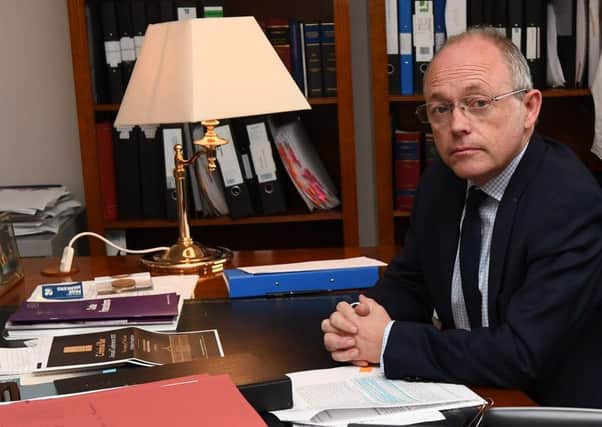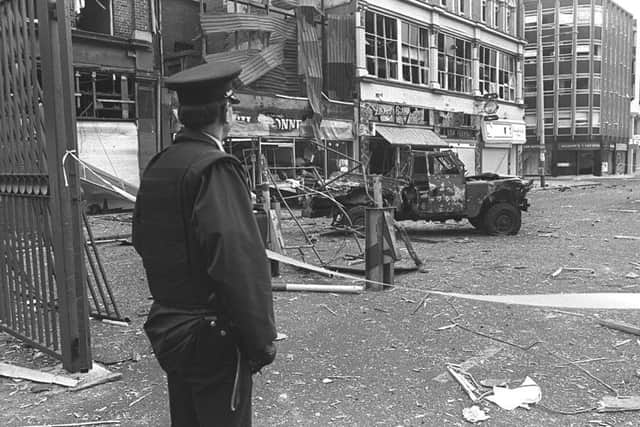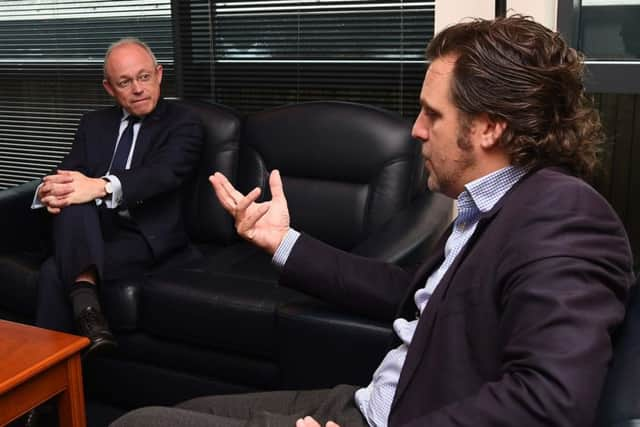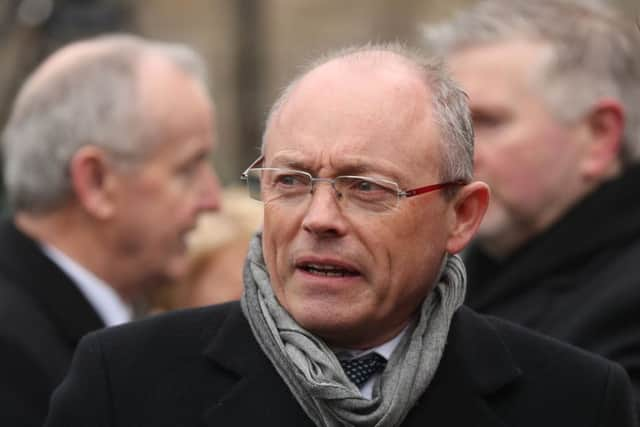DPP: The state is at a disadvantage in Troubles probes but there is no prosecution bias


It was more than a year ago when Barra McGrory agreed to talk to the News Letter.
The interview that might have taken place in early 2016 is not quite the one that happens now, because legacy has since flared up.
Advertisement
Hide AdAdvertisement
Hide AdSoldier prosecutions have heightened unionists fears of an imbalanced approach to the past, across the criminal justice system, that is overly focused on the past actions of the police and army.


Asked about the number of prosecutions, Mr McGrory, who retires in the autumn after six years in post, cites previously released figures that the Public Prosecution Service (PPS) has prosecuted seven republicans, three loyalists, and three soldiers.
“So I’m confused as to where the perceived imbalance is?” he says. “I mean it’s just simply not the case.”
But there is a perception, for example among some victims groups, of a reluctance by the various authorities to take on mainstream (ie non dissident inclined) republicans because it would inflame ex-Provisionals.
Advertisement
Hide AdAdvertisement
Hide Ad“But that’s just nonsense and not borne out by the evidence. If the police come to us with a file on someone regarded as a mainstream republican it would be looked at and determined on the evidence.”


But there is also a view that if 10% of Troubles killings were by the state, and if they were overwhelmingly legitimate, then on a pro rata basis there should be few security force prosecutions?
“No-one engaged in the investigation or prosecution of crime can be permitted to make that assumption ... which is that the vast majority of the state killings are legitimate. We can’t do that.
“Now, we must start from the evidence that is put in front of us and examine it and then make a clinical decision on the basis of the evidence and the application of the law whether or not that is a legitimate killing.”
Advertisement
Hide AdAdvertisement
Hide AdWhat about the other end of the spectrum, the perception among republicans that their killings were not terrorism and were legitimate?


“Well, I don’t accept that either. The other side of that coin is that the police and the prosecuting agency whenever a death happens must view that death with an absolutely open mind, but it must examine the evidence first, and then apply the law.”
Does Mr McGrory think the state is at a disadvantage in legacy investigations because it has records?
“Yes. That is a fact because, as you say, state actors have responsibility to record a lot of their actions. Whether or not all of them are recorded is sometimes in dispute but there is no doubt about it, because of the role that state actors play, there will by implication be more evidence available in respect of their actions.”
Advertisement
Hide AdAdvertisement
Hide Ad(Mr McGrory later clarifies that record keeping can be to the advantage of state actors who are blameless.)


“ ... but look, I accept the point that those who engaged in paramilitary violence didn’t keep records of their actions so it’s harder to detect them and that’s one of the reasons why I think the conviction rate will be significantly lower when one attempts to revisit the paramilitary end of this.
“... I have to say the vast majority of members of the security forces I have no doubt engaged with integrity and considered themselves to be behaving lawfully, but the difficulty we have is that there are a significant number of situations where they didn’t get the benefit of rigorous investigation at the time, for various reasons, and that’s why they are now being revisited and they’re at a disadvantage in a number of respects, but they could also be at an advantage.”
What does he as a prosecutor think a society should then do if its forces, despite failures, fundamentally adhere to the rule of law yet fail even to come close to getting justice against determined terrorist leaders and massacre culprits?
Advertisement
Hide AdAdvertisement
Hide Ad“It’s a hugely difficult political question that I can’t deal with as the state prosecutor. We can only deal with evidence and processes with which we’re engaged but there are outstanding political issues which require to be addressed and I’m as frustrated as the next person in this jurisdiction that it remains unresolved.”
In what sense does he think it is unresolved?
“Well, we’re still talking about it. I as the chief prosecutor am determining whether or not to prosecute cases arising from incidents which happened at the very beginning of the Troubles. That’s unfortunate. They’re very difficult cases to decide. Nobody’s happy. The victims have waited 40 years for prosecutorial decisions and investigations, evidence has gone stale, has been lost.


“You have suspects in these cases who considered that they had already been dealt with by the system and at the end of their lives they’re now being confronted with criminal justice processes that are a significant strain on them and their families. That’s not a happy situation.”
What sort of things does Mr McGrory think might be done politically about this?
Advertisement
Hide AdAdvertisement
Hide Ad“Probably the best I can say about that at the moment as the sitting DPP is that this is a unique and extremely difficult place to be as a society in terms of the application of criminal justice and it might require extraordinary measures beyond the scope of my role at the moment.
“Nobody need be under any illusions that the application of criminal justice to a context which is now up to 40 years old in many situations, will be easy,” he says.
“These processes by their very nature must be comprehensive, the prosecutorial decisions cannot be taken until all avenues have been investigated and the likelihood of successful prosecutions in the vast majority of these cases will be slim, but if society determines that that’s what needs to be done then we will do that to the best of our ability, but my expectations for satisfying the general public in the context of that process are not high because by their very nature, people will assume that if there is no prosecution that somebody is hiding something and they will look at it through the prism of their own understanding of our history.”
• There is a tidal wave of requests to review killings by soldiers
Advertisement
Hide AdAdvertisement
Hide AdThe DPP’s directions to the PSNI to investigate legacy cases (so-called 35.5 directions, which will be examined in later parts of the interview with Mr McGrory) are highly controversial because – as the News Letter revealed earlier this year – they all relate to allegations against the security forces.
Asked about the fear that the PSNI legacy investigations branch could become bogged investigating alleged state wrongdoing and have little remaining capacity to investigate terrorists, Mr McGrory says: “I understand that, but it ignores the fact that there already were comprehensive PSNI investigations into all non-state related killings and other incidents.
“I mean 30,000 people went to jail. We had a comprehensive investigation of the paramilitary campaigns as they were happening.”
He adds: “The anomaly has now arisen that there are those who believe that there never was an investigation of the state, by itself, and that’s what we’re now dealing with ...”
Advertisement
Hide AdAdvertisement
Hide AdIn other words, the failure to do this at the time is inevitably going to lead to an imbalance today? By catching up?
“Yes ... but it would be unfair to blame the prosecutors and the police trying to deal with the situation today for that situation. It is a fact of the conflict.”
Is he saying that essentially the blame lies in the failure to investigate at the time?
“I have to say so ... it’s grossly unfair to blame the police and the prosecutors and the courts for dealing with that situation as we find it today and similarly in terms of the soldiers, I have great sympathy and understanding of the situation these soldiers are in, but the state failed them in 1969, 1970, 1971 in not permitting the civil police force, which was the RUC, to investigate those incidents.
Advertisement
Hide AdAdvertisement
Hide Ad“It came to an arrangement that the RMP [Royal Military Police] would do it.”
(An agreement was reached between the then RUC chief constable and the general officer in command of the British Forces that the RMP would look at all soldier shootings. Some 200 fatal shootings fall under that umbrella, Mr McGrory says).
“Now the first DPP when he was appointed stopped it.
“He was outraged when he discovered that was the situation and he refused to take prosecutorial decisions anymore.”
Who was that?
“Sir Barry Shaw. He refused to take prosecutorial decisions anymore until the civil police force was permitted to investigate incidents involving soldiers and he was instrumental in having that stopped but the problem is that 40 years later his successor has to deal with all of those cases which happened before he stopped it because, as I’ve explained to you, they’re now being brought to my attention.
Advertisement
Hide AdAdvertisement
Hide Ad“So I think it’s unfair to seek to blame me as DPP, or the chief constable for carrying out investigations during that period and I understand the frustration of those who are now being subjected to investigation and prosecutorial decisions 40 years after incidents which they considered to have been long since dealt with.”
Mr McGrory adds: “That is as a consequence of an historical anomaly.”
Was the arrangement that the RMP and not the RUC investigate the soldier killings an illegal one?
“I’m not going to deal with that because I don’t know if it was against the law, but the problem is that this has given rise to a belief amongst the families of those who were killed by the soldiers at that time that justice was never done.”
Advertisement
Hide AdAdvertisement
Hide AdThe families, Mr McGrory adds, have “in significant numbers” have gone to the Attorney General John Larkin, and some of the cases have been forwarded to the DPP with a view to prosecution.
Could there be a tidal wave of these cases?
“Well, there, there already has been,” says Mr McGrory.
• I don’t think my attendance at McGuinness funeral was out of place
Asked about his attendance at the funeral of the former Sinn Fein deputy first minister and ex IRA leader Martin McGuinness in Londonderry in March, Mr McGrory says:
“I mean I went into Martin McGuinness’s funeral a few steps behind Arlene Foster so, you know and I was sitting in the justice benches sandwiched between the chief constable and the chairman on the Policing Board, so I don’t think my attendance there was in any way out of place.”
Advertisement
Hide AdAdvertisement
Hide AdNews Letter: But it might make people then think that you would be reluctant to prosecute some republicans?
“Yeah, but the evidence would show the contrary in that I have prosecuted more republicans than I have loyalists, in terms of legacy cases because that’s the evidence that has been put before us without hesitation and without fear or favour and in any case in which I have thought that there might be a perception of a conflict of interest I have removed myself from it.”
NL: Would you consider yourself friendly with people like Gerry Adams and the late Martin McGuinness?
“My relationship with those individuals is purely professional as it is with any other person who asks me to represent them.”
Advertisement
Hide AdAdvertisement
Hide AdNL: Again, back to perceptions, prosecutors reinstated a charge against a soldier that had been struck out by a judge, which might give the impression of determination to prosecute soldiers?
“Well the problem with those cases, and I have to be very careful because it’s a live case … but you have to understand that the first indication that there would be no prosecution was following the RMP investigation process, the next indication would have been in the context of HET visiting of it. Both of those processes have been severely criticised in reports by academics and by HMIC.
“So, you know when people complain that ‘I’ve been told twice that I wouldn’t be prosecuted’, one has to put that in context. So, without getting into the detail of those cases, they are ongoing and the court will deal with them.”
• On Monday and next week: Mr McGrory on the Stakeknife probe; the controversial section 35.5 legacy directions (all focused on police-army); the Pastor McConnell trial; and similarities between Irish & Scots Gaelic